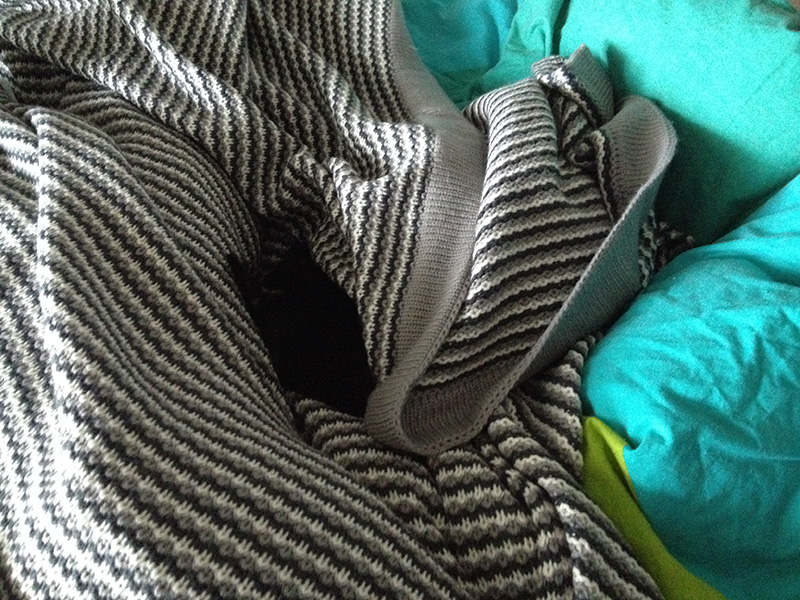La plupart des gens noient le poisson leurs soucis dans l’alcool. Moi, je préfère me noyer dans la grammaire 😉 Et comme c’est la rentrée des classes, je me suis dit que j’allais vous montrer ce que mes pauvres étudiants doivent subir avec ce premier test de grammaire et voir si vous pourriez recevoir une bonne note dans ma classe (en fait, tout ça est hyper facile pour “nous,” je pense, mais c’était hyper difficile pour mes étudiants). J’attends vos réponses dans les commentaires, hehe (vous pouvez répondre en français of course)!
- What’s the tense of this sentence?
- By the year 2020, we will all have graduated and found wonderful jobs.
- Circle and name the pronoun(s) you find in the following sentences:
- She convinced her husband not to accept the job abroad.
- Although this is mine, you can borrow it for now.
- Circle the adverb(s) you find in this sentence.
- He gently woke the sleeping woman.
- Circle the preposition(s) you find in this sentence:
- In our school the teachers’ basic hourly rate was increased by 5%.
- Explain why “an” is correct in this sentence and not “a”.
- They didn’t want to travel in an airplane.
- Explain the grammatical changes that take place when you change a positive sentence into a negative sentence (for example: “yesterday I spoke to my friends” changed to “yesterday I did not speak to my friends”).
- Explain the grammatical purpose and form of the bold section in the following sentence.
- The boy didn’t know his lesson, did he?
- Look at the following forms of different verbs and explain everything you can about these forms using the correct grammatical terms:
- to speak
- knew
- singing
- forgets
- given
- Explain why you can say “he was smarter than I was” but not “he was intelligenter than I was.”
- Which sentence is correct and why?
- Many new books were sent to Tom and I during our first year abroad.
- Many new books were sent to Tom and me during our first year abroad.
- Explain the grammatical differences between these two verbs:
- to speak
- to break up
- Which sentence is correct and why?
- The students were told to open their books and start reading.
- The professor told the students to open their books and start reading.
- What is wrong with the following sentence and why?
- He ate his dinner very quick.

Il faut que je fasse super attention, quand je m’asseois sur mon lit, parce que parfois une Calinette s’y camoufle 😉

Je ne suis vraiment pas certaine du tout d’avoir la moyenne….mais alors, pas du tout…..
LikeLiked by 1 person
Il faut essayer 🙂
LikeLike
En français, je ne connais aucune règle de grammaire mais je “sens” si une phrase est correcte ou pas. Je n’ai pas ce “feeling” en anglais :-\. Mais j’ai enquêté sur “Tom and I” versus “Tom and me” et j’ai acquis la conviction que dans la phrase proposée, c’est “me”.
LikeLike
Et tu as raison, dans ce cas-là 🙂 Un point pour toi!
LikeLike
Dans la question 12, je trouve les deux phrases grammaticalement correctes… C’est grave Docteur?
LikeLike
Ca doit être une question de virgule, une de ces règles à la noix que personne ne connaît… Non? Ça fait trop longtemps, j’ai tout oublié.
LikeLike
Non, y’a pas de règle à la noix dans mon quiz, je suis pas le genre!
LikeLike
J’ai aussi de la peine avec cette question 12.
Donc mon explication : to tell something et pas to tell to do smth. Du genre “he told them that they needed to open their book”
LikeLike
Non, “to tell them to do something” est entièrement correct 🙂
LikeLike
Haha, tu as entièrement raison! Mais la plupart de mes étudiants disent qu’utiliser la voix passive c’est le mal (j’en avais parlé là: https://cestpasmoijeljure.com/2011/10/12/parler-damour/) alors c’est une trick question 😉
LikeLike
1. Future perfect
2. a) she: personal pronoun / her: possessive pronoun
b) this: ?pronoun / mine: possessive pronoun / it: pronoun
3. gently
4. in / by
5. because airplane starts with a vowel
6. the verb becomes the “did not” form (or do not in the present tense)
7. it reinforces the affirmation. the form is to use the opposite (negation vs positive or positive vs negative form) of the verb.
8. a) infinitive form
LikeLike
hé j’ai pas fini!
8. b) simple past
c) continuous / present participle
d) present
e) past participle
9. because “smart” becomes “smarter” (it’s a short word) whereas intelligent is a long word and it would sound akward to add an “er” at the end. The right form would be “more intelligent than… ”
10. the second is correct because “I” would be subject and in this sentence the “I” person is not the subject.
11. “to speak” is a simple verb and “to break up” is a prepositional verb.
12. both sentences are correct, the first is in the passive form, whereas the second is in the active form
13. “very quick” is an adjective, “very quickly” should have been used, the adverb describing the way the dinner was eaten.
Hahaha, j’me suis bien marrée. Les explications sont dans un très très mauvais anglais, mais j’ai apprécié rechercher dans ma mémoire certaines réponses. Pas évident de trouver les bons termes par contre!
Allez une copie de plus à corriger ;)!
LikeLike
Merci d’avoir joué le jeu 😀 Tu es super forte!! Il y a juste tes réponses aux questions 6 et 7 qui sont un peu vagues. Et la 11 qui est correcte mais moi j’utilise un autre terme (plus souvent utilisé dans l’enseignement de l’anglais comme langue seconde). Et la 8.c. où il manque deux autres possibilités et la 8.d. qui manque de précision 😉 Ah, et “this” c’est un pronom démonstratif.
LikeLike
Je lis plus bas le “gérondif” et c’est clairement un mot qui était totalement sorti de mon vocabulaire!!!
Merci d’avoir joué le jeu des corrections ;), ça m’a fait plaisir ce ptit exercice! (maso? probablement!)
LikeLike
je suis incapable de faire cet exercice sans prendre la journée et chercher dans mes bouquins..je vais essayer de faire faire cet exercice par ma fille,(rédactrice-traductrice) on va voir! gros câlins à Calinette, bises
LikeLike
Chouette 🙂 Envoie-moi ses réponses!
LikeLike
Ah, des prépositions, des verbes à particule, des adverbes (invariables, masi les adjectifs aussi, en anglais, c’est ça qui complique le truc!)… En revanche, j’avoue sécher aussi pour la question 12…
LikeLike
Bah, pour une prof de langue, ça doit être fastoche, non? 🙂 Pour les adjectifs, oui, c’est pas mal difficile en anglais, j’en avais parlé là-bas: https://cestpasmoijeljure.com/2014/08/01/compter-les-bisons/
LikeLike
Ca fait des années que je ne “pratique” plus vraiment l’anglais… Je le comprends très bien, mais je le parle paraît-il avec un accent allemand, et la grammaire s’enfuit un peu.
Pour la question 8c, j’ajouterais un gérondif à la réponse fourrnie ci-dessus, et “forgets” est évidemment une troisième personne du singulier du présent simple (mes collègues se battent suffisamment pour que leurs élèves n’oublient pas ce “s”)…
LikeLike
Je rajouterais bien un “to” à la,première phrase ? inutile ?
The students were told to open their books and to start reading.
The professor told the students to open their books and start reading.
LikeLike
Non, pas besoin de répéter le “to” puisque tu gardes la même construction grammaticale et le même sujet. Autre exemple, “yesterday, I went to the market and to work.” Pas besoin de répéter “I went” parce le sujet et le verbe et la construction du verbe sont les mêmes pour les deux endroits où tu vas. C’est pas faux de faire la répétition mais c’est redondant 🙂
LikeLike
Les questions type “and why”, j’ai envie de répondre “because english” :). Mais c’est juste parce que je suis un chieur.
Sinon, la dernière:
“What is wrong with the following sentence and why?
He ate his dinner very quick.”
Il y a deux problèmes, en fait. Le premier, c’est quickly et pas quick, mais ça tout le monde l’avait vu. Le deuxième, c’est que c’est une hérésie de ne pas savourer son repas. Voilà. :p
LikeLike
Je ne prends pas de risque. Un like seulement.
LikeLike
Alors je me pose une question pour la 1… Est ce qu’en linguistique on ne part pas de l’idée qu’il n’y a que 2 “tenses” en anglais ? Le présent et le passé ? Et que du coup le futur c’est juste un truc qu’on obtient grâce au modal “will” ? Et après, j’ai appris, me semble-t-il, que le Have + EN c’est un aspect, et non, un “tense” à proprement parler donc ? 🙂
LikeLike
Ah mais je n’enseigne pas la linguistique, j’enseigne la grammaire de base à des gens qui vont ensuite aider des étudiants internationaux à mieux écrire en anglais 🙂 L’enseignement de l’anglais à des étrangers et les analyses linguistiques de l’anglais sont des choses trèèèèèèèèèèèèès différentes!
LikeLike